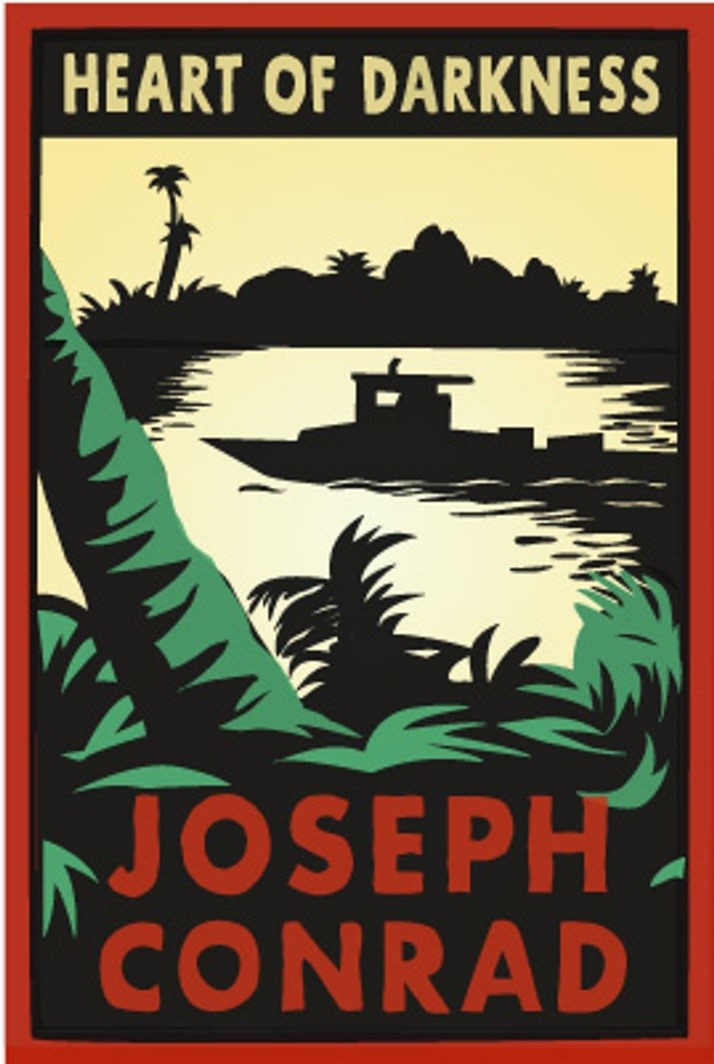
Heart of Darkness by Joseph Conrad is a dark yet introspective book about the main character, Charlie Marlow’s moral struggles as he journeys through the depths of the Belgian Congo. Thenovella begins as Marlow looks out at the Thames River with his crew near London. There, he wonders how the ancient Romans must have felt when they first arrived in Britain, and how distant they must have felt from the seemingly mysterious land. The original narrator, one of Marlow’s fellow crew members, notes Marlow’s change personality and the way he seems to see the ocean as his constant home, no matter where he sails.
As the crew watches the sunset, Marlow makes eerie comments about life and abruptly takes
over the narration. He begins to tell the crew the story of his journey into the Congo, the very
heart of Africa. Ever since he was a child, Marlow had dreamed of exploring the unexplored and
traveling to the blank spaces on his maps. He was especially enticed by the rivers—watery snakes winding across the land.
Once he has grown, Marlow begins to work for a trading company. In preparation for his trip, Marlow bids goodbye to his fussy aunt, one of the few women mentioned in the novella. After receiving a letter from her, Marlow remarks that women are out of touch with the truth. He
believes that women live in their own separate beautiful worlds and must be protected in their
simplicity.
When he finally embarks on his journey and arrives in the Congo, Marlow is exposed to the Company’s true operations and their greed for ivory. His job is to find the infamous Mr. Kurtz, the trader who gained the reputation of finding the most ivory and making the most sales. Since then, it had been said that Kurtz had gone mad and joined the “wild” native Africans.
Throughout his journey, Marlow witnesses the toil and torture of enslaved Africans in the
Company trading posts. Stepping away from one of these company officials, Marlow sees
several black figures curled and shrinking beneath the trees near the Congo River. The slaves
there are starving—dying slowly from malnutrition and exhaustion. Marlow, though fully aware
that he has bread in his pocket, stands frozen, conflicted about the morality of the situation. He
feels bad for them, but that’s all he really gives—pity.
Throughout the book, it becomes apparent that the European colonists see the native Africans as savage and animal like, no matter whether or not they are enslaved. The reader is forced to wonder if Marlow too confirms to these racist beliefs. As Marlow travels deeper into the heart of Africa and closer to the mysterious Kurtz, he has to dig deeper within himself to solve is own questions of morality and find his true identity.
Though this book is relatively short, it is also very dense. It definitely needs to be reread and analyzed to fully appreciate and understand its meaning. This was off-putting for me at the
beginning, and it took me a while to uncover the complexities of the novella. However, after
reading and analyzing Heart of Darkness , I began to appreciate it more. Joseph Conrad has a
very beautiful, eloquent writing style, which helped me stay engaged in the book. Furthermore,
the more I looked back on the novella, the more I realized how many interesting layers there
are. Not only is this a story about colonialism and race, but also the power of greed and
corruption. It shows how European colonizers treated other countries as goods for profit rather
than places with people and cultures. There are also several archetypal ideas such as the
hero’s journey, dark versus light, and good versus evil as well as mythological references such
as the Fates, Buddha, the Devil, and the underworld.
If I were to rate this book, I’d probably give it a 7.5 out of 10. Although it has many interesting analytical facets, it was hard to grasp the meaning the first time around. However, it is extremely well written and is a classic piece of literature. Overall, I am glad I read Heart of Darkness , and I would recommend it to anyone interested in post colonialism.
